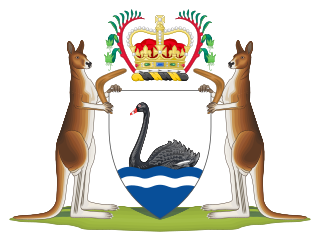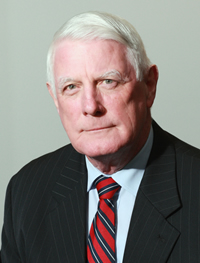
A judge is a person who presides over court proceedings, either alone or as a part of a panel of judges. In an adversarial system, the judge hears all the witnesses and any other evidence presented by the barristers or solicitors of the case, assesses the credibility and arguments of the parties, and then issues a ruling in the case based on their interpretation of the law and their own personal judgment. A judge is expected to conduct the trial impartially and, typically, in an open court.
John Jeremy Doyle,, Australian jurist, was the Chief Justice of the Supreme Court of South Australia, the highest ranking court in the Australian State of South Australia, between 1995 and 2012.

The District Court of Western Australia is the intermediate court in Western Australia. The District Court commenced in 1970, amid additional stress placed on the existing Magistrates Court and Supreme Court due to the increasing population of Western Australia. At its inception, the Court consisted of four judges: Sydney Howard Good, William Page Pidgeon, Desmond Charles Heenan and Robert Edmond Jones.
Brian Ross Martin is an Australian jurist. He was a judge of the Supreme Court of South Australia before being appointed Chief Justice of the Supreme Court of the Northern Territory in 2004. He served in the Northern Territory between 2004 and 2010. He served as an acting Judge of the Supreme Court of Western Australia in 2012. In legal texts, he is referred to as "Martin (BR) CJ" to avoid confusion with his predecessor.
Sir William Edward Stanley Forster was the first Chief Justice of the Supreme Court of the Northern Territory holding that position from 1979 to 1985. Before that he was the first Chief Judge from 1977 to 1979 and Senior Judge from 1971 to 1977, all positions which were effectively the same.

The Magistrates Court of South Australia is the lowest level court in the state of South Australia. The Magistrates Court, then known as the Court of Petty Sessions, was established in 1837, by the Court of Sessions Act 1837. It has both original and appellate jurisdiction and hears matters specified in the Magistrates Court Act 1991 (SA).
Dean Mildren, is a former judge of the Supreme Court of the Northern Territory. He was appointed to the court on 27 June 1991, and retired February 2013. He is sworn in as an acting judge of the court, so from time to time still adjudicates on cases in the Northern Territory.

The Family Court of Western Australia is a state court that deals with family law. It was established by the passing of the Family Court Act and commenced operation in 1976. It is a state family court under section 41 of the Commonwealth Family Law Act 1975, and deals with the same family law matters as the Federal Circuit and Family Court of Australia, including divorce, marital property settlements, and child custody, and also adoption and surrogacy. Although funded by the Australian Government, it is the only state-based family court in Australia. The reason for the creation of the court as a state court was to bestow additional jurisdiction related to family law on the court, which were beyond the scope of federal power, such as de facto arrangements and adoptions.
John Spence Winneke, was a judge of the Supreme Court of Victoria and President of the Court of Appeal of the Supreme Court of Victoria, which is the highest ranking court in the Australian state of Victoria.
John Roderick McKechnie is the Commissioner of the Corruption and Crime Commission of Western Australia. He is a former Justice of the Supreme Court of Western Australia, the highest ranking court in the Australian State of Western Australia, and formerly served as the State's first Director of Public Prosecutions.
John Alexander Logan, SC is a judge of the Federal Court of Australia, President of the Defence Force Discipline Appeal Tribunal, a Deputy President of the Administrative Appeals Tribunal and judge of the Supreme and National Courts of Papua New Guinea.

Sir Richard Arthur Blackburn was an Australian judge, prominent legal academic and military officer. He became a judge of three courts in Australia, and eventually became chief justice of the Australian Capital Territory. In the 1970s he decided one of Australia's earliest Aboriginal Land rights cases. The annual Sir Richard Blackburn Memorial lectures in Canberra commemorate his service to the Australian legal community.
Murray Herbert Tobias, was an Australian jurist who served as a judge of the Court of Appeal of the Supreme Court of New South Wales from April 2003 to March 2011.
Peter Garling, RFD is an Australian judge, a Judge of the Supreme Court of New South Wales, the highest court in the state of New South Wales.
Major General Gregory Howard "Greg" Garde, is a senior Australian lawyer and Army officer. His positions and appointments have included Queen's Counsel, Supreme Court Justice, President of the Victorian Civil and Administrative Tribunal, and membership of various boards of directors.
The Judge Advocate General (JAG) of the Australian Defence Force (ADF) is an office established under the Defence Force Discipline Act (1982). This position is held by a judge or former judge of a federal court or a state supreme court. The appointment of the JAG is made by the Governor-General-in-Council. The JAG has the authority to establish procedural rules for tribunals operating within the Navy, Army, and Air Force. They also conduct the final legal review of proceedings within the ADF and play a role in the appointment of judge advocates, Defence Force magistrates, presidents, and members of courts martial, as well as legal officers for various purposes. Additionally, the JAG is responsible for reporting on the operation of laws concerning the discipline of the ADF.
Lorraine Anne Walker is the Chief Magistrate of the Australian Capital Territory and was an Acting Judge of Supreme Court of the Australian Capital Territory.
Louise Taylor is a judge of the Supreme Court of the Australian Capital Territory, appointed on 26 July 2023 and due to be sworn in during August 2023. Before this appointment, she has been a Magistrate of the ACT since September 2018. She is the first Aboriginal person to be appointed as a judicial officer in the Australian Capital Territory, and the first Indigenous woman to become a Supreme Court judge in Australia.
Hon. Justice Gail Ann Archer is a judge of the Supreme Court of Western Australia.
Baratang Constance Mocumie is a South African judge of the Supreme Court of Appeal. Before joining the Supreme Court, she was a judge of the Free State High Court from March 2008 until June 2016. She is also a judge in the Military Court of Appeal and the primary South African liaison judge to the Hague Conference on Private International Law, and she was the president of the South African chapter of the International Association of Women Judges between 2010 and 2014. She began her legal career as a prosecutor and magistrate in the North West and Gauteng provinces.




